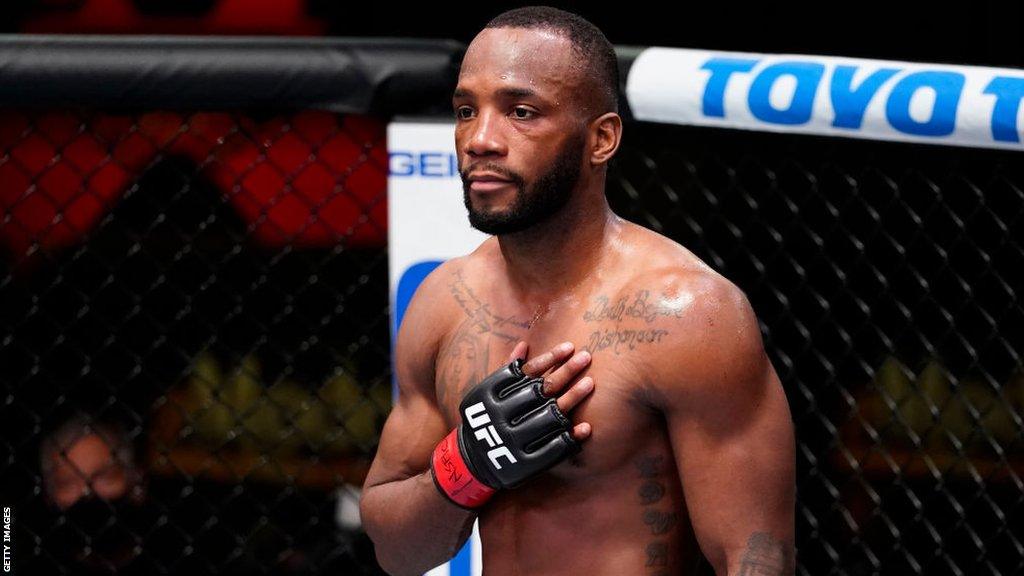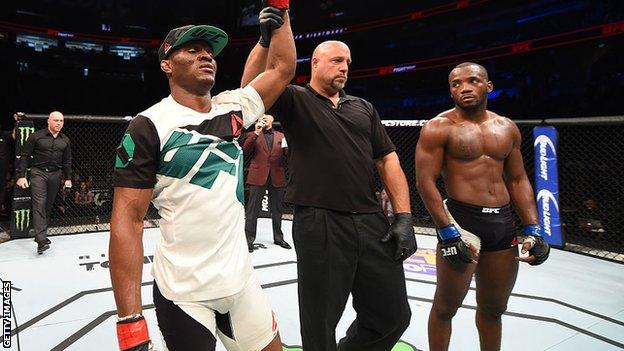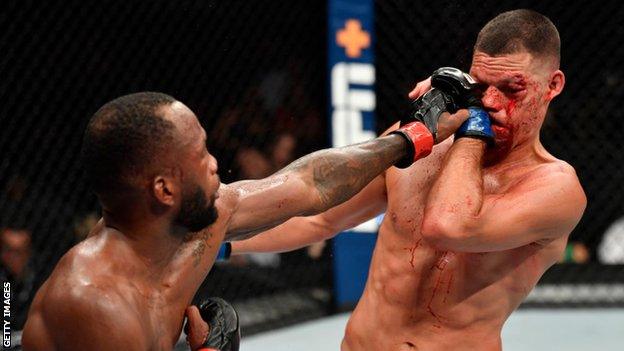Kamaru Usman v Leon Edwards: 'I'll prove Britons can be UFC champions from home'
- Published

Leon Edwards was born in Jamaica and moved to Birmingham at the age of nine
Leon Edwards says his title fight against Kamaru Usman will prove Britons do not have to move abroad to become UFC champions.
UFC president Dana White said last week, external that Edwards, who lives and trains in Birmingham, will fight for welterweight gold at a date yet to be confirmed.
Should Edwards win, he will follow Michael Bisping in becoming only the second British UFC champion in history.
Bisping won the middleweight title in 2016 but lived and trained in America.
"When I was younger I started believing that you have to move to America," Edwards, 30, told BBC Sport.
"But apart from Bisping, I can't name one other fighter who's left the UK and moved to America and been successful."
"So where is the blueprint to say this works? It doesn't. You just need the right team around you, believe in yourself, work hard and dedicate yourself where you need to."
'I've been preparing for this fight for seven years'

Usman beat Edwards by unanimous decision in 2015
Edwards' title opportunity follows a 10-fight unbeaten streak, including impressive victories over Nate Diaz, Rafael dos Anjos and Gunnar Nelson.
His last loss came against Nigeria's Usman in 2015 where he was outpointed over three rounds.
Since that fight, Usman has gone on to become a dominant force in the UFC, with the 34-year-old rising to the top of the pound-for-pound rankings.
Edwards sees the rematch as an opportunity to avenge the first loss and is eager to prove he can beat Usman.
"I've been preparing for this fight since I last lost to him - I've been watching him, studying him and figuring out ways to beat him," said Edwards.
"So to have a title opportunity and go back and get revenge for your last loss six or seven years ago - to take the title off him as well is such a bonus. It's perfect."
Edwards was out-wrestled during the first fight against Usman with the welterweight champion saying he will use the same tactics in the rematch.
It's not a strategy which concerns Edwards however, with the Briton pointing to improvements he has made in his all-round game.
"That's how I lost last time so I'm not going to lose like that again," said Edwards.
"I'm a totally different fighter now, just with my understanding of MMA."
"When I first fought I was more of a striker than anything - my striking got me to the UFC, so I just relied on that to be champion. But I found that I couldn't."
"I'm 30 now and have learned so much, improved so much, and understand so much more now."
'Time off was a blessing in disguise'

Edwards' last fight was against Nate Diaz in June when he outpointed the American over five rounds
Part of the reason Edwards has been able to improve so much is the amount of time he has spent out of fight camps and the octagon.
Since a bout against Tyron Woodley was scrapped two years ago because of the Covid-19 pandemic, a number of fights involving Edwards since have either been postponed or cancelled as a result of fighters contracting the virus or sustaining injuries.
In October 2020, the UFC even removed Edwards from their rankings because of inactivity, but reinstated him a day later.
Edwards said although the ups and downs at first were tough to accept, he learned to use it to his advantage.
"When you get demotivated it's easy to think 'well, I'm not going to train this today then' and muck about, but what do you achieve from that in the long run?" said Edwards.
"I did that for a little bit but then I thought 'no, I need to use this time to improve', and that's what I did.
"Now when I do fight for the title it might be a blessing in disguise that I was able to improve in areas that I needed to."
"I've been able to improve my wrestling, my jiu-jitsu, my striking and my understanding of distance, and I think it's going to pay off in the title fight."
The ideal scenario Edwards says, is to beat Usman and become champion with a title defence in Birmingham further down the line.
He added: "I'd love to do one in Birmingham you know - win the belt and demand them [the UFC] to come back to Birmingham. It's been about 10 years."

Who were the real Peaky Blinders?: Explore the origins of this mass gang movement
The rise of the American far right: Louis Theroux meets the movement's key figures
